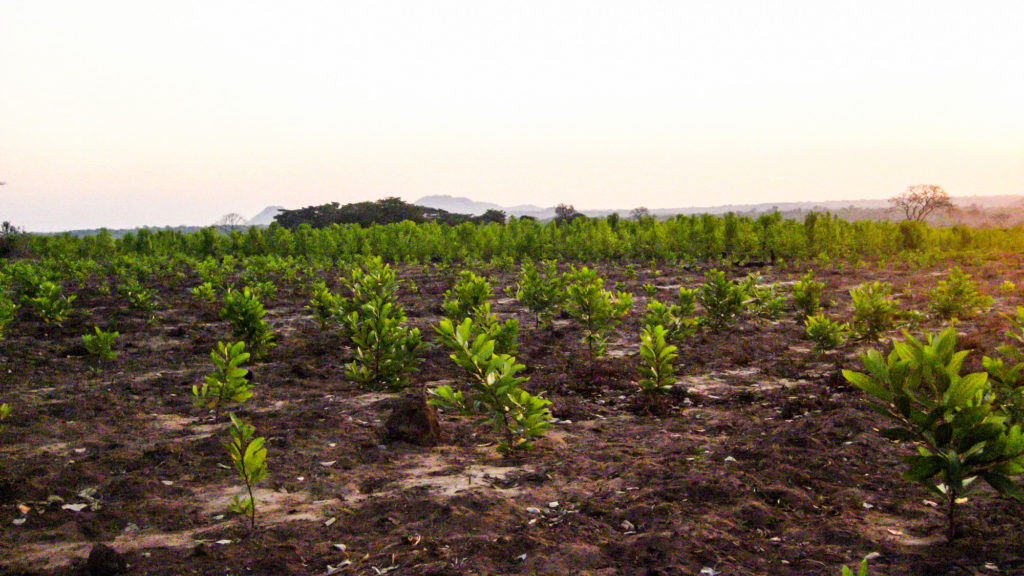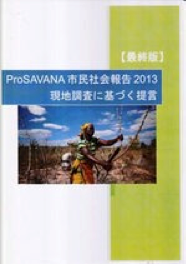[Original (June 5, 2018); Translated by M. Kanai/J. Hills]

Land expropriated by foreign investment companies where acacias are planted. It is said that land grabs were executed until the mountain in the back.
Since 2013, JVC has been committed to activities of advocacy against the ProSAVANA project, one of many Official Development Assistance (ODA) projects led by the Japanese government.
What is ProSAVANA?
Officially called the “Program of Triangular Cooperation for the Agricultural Development of the Tropical Savannah in Mozambique”, ProSAVANA is an ODA project co-managed by Japan, Brazil, and Mozambique. This largescale agricultural development project covers an area of approximately 14 million hectares (more than three times the cultivated land area in Japan) in the northern provinces of Mozambique.
The ProSAVANA project was born out of the success of projects undertaken by Japan in Brazil during the 1970’s (Cerrado development project, see below). As a “Triangular Cooperation” project, it involves the close cooperation of Japan and Brazil in Mozambique and is said to directly benefit 400,000 people engaged in small to medium sized farms. Moreover, it is said to indirectly benefit 3.6 million people working in agriculture. Despite these perceived benefits, it has received a lot of criticism from Mozambican locals due to the wide range of problems it also causes throughout the implementation process.
【Cerrado Project】
A project that transformed the tropical savannah region in the middle-west Brazil, Cerrado, previously regarded as “barren and desolate”, into one of the world’s leading producers of soy and corn. This was made possible by efforts aimed at improving soil quality, the cooperation of numerous organisations, agricultural development, and the provision of production funds within the context of an ODA project. In Brazil, this became known as the “Green Revolution.” Despite this, the project has been criticised for having inflicted severe environmental damage to the region.
Why is JVC concerned about the project? What are the issues involved?
The ProSAVANA project is an ODA project where the Japanese government supports large-scale agricultural development by industries in the northern regions of Mozambique in collaboration with the Brazilian government. Currently, Mozambique is categorized as an LDC (Least Developed Country) due to the aftermath of the prolonged conflict. However, many of the farmers have been engaged in family and community-based self-sustaining farming although the productivity has not necessarily been high. In general, land in Mozambique belongs to the nation, although the Constitution guarantees land-use rights to farmers. For this reason, they have little interest in “land ownership” and the monopolization and trading of land by individuals has been limited. Under such circumstances, it is probable that the present style of family farming for in-house consumption and community-based cooperative farming has emerged. At the same time, farmers’ food sovereignty (right to food) used to be protected to a certain extent.
On the other hand, marketization moves ahead, and large-scale agricultural development by private companies and investors gradually makes inroads into villages. This results in the rapid increase of land grabs, expropriating the lands of farmers who are not well-aware of their own land ownership rights. ProSAVAVA is a project conceived in this context. The aim of the government is nationwide increase in agricultural productivity. However, a hasty introduction of a large-scale industrial agriculture may accelerate land grabs. Furthermore, due to the authority centralization, stemming from the poor governance of the government, which is often observed in the post-conflict peace building process, the farmers concerned are denied the opportunities to participate in the decision-making regarding “development” such as this.
In other words, ProSAVANA carries with it various problems: food sovereignty and the way the agriculture should exist, land grabbing and issues regarding the farmers’ rights, development and participation of the local residents and other interested parties. Although the project in question is not taking place within one of JVC’s operation sites, the issues revealed in the project share common aspects often found in JVC’s activities. Therefore, it is meaningful for JVC to get involved in research and advocacy on the project in order to establish our own views on these issues. We can also learn the way citizens’ movements should be carried out and expand our network with various citizens’ groups. The underlying issues are: how African countries as a whole should be developed and how South-South cooperation should be implemented with particular focus on newly developing countries. In these countries, safeguard policies such as “Guidelines for Environmental and Social Considerations” are yet to be established within the context of an ODA project. Further issues include governance issues deriving from authority centralization during post-conflict peace building processes as well as ensuring the participation of local residents. JVC aims either to abolish or drastically review the project mainly through “ProSAVANA Opinion Exchange Forum” which started as a spin-off of the ODA Policy Council composed of NGOs and officials of the Ministry of Foreign Affairs. We also support the activities of the “Citizens’ group that thinks about Mozambique Development Projects.”
We prepared a report based on the field survey

Regarding these issues, JVC conducted an on-site survey in collaboration with other organizations in August 2013. The implementer of the ProSAVANA project presented the following presuppositions as conditions for project implementation:
- Small farmers suffer from starvation due to their inability to produce.
- Investment and small farmers can coexist. Therefore, investment will enrich their life.
- There is still a vast amount of unutilized land available for cultivation.
- Dialogue with farmers concerned are maintained and promoted.
Our survey, however, shows that these presumptions are completely different from reality. This report was jointly prepared by those NGOs who took part in the on-site surveys. It contains as many as 338 pages and provides the most detailed information regarding the issue among other related publications in Japan. You can purchase it from the URL below. The sales are to be used to cover expenses for the secretariat to conduct field survey in Mozambique and advocacy activities.
Purchase the Report
JICA’s official documents were analyzed
Although “the lack of transparency” of the ProSAVANA project has been widely pointed out, the situation has remained unchanged. In addressing the problem, we, Japan’s civil society organizations, obtained over 100 official documents based on the Official Information Disclosure Law. In May 2016, 46 documents concerning the ProSAVANA project were made publicly available on the following site.
http://farmlandgrab.org/26158
We compiled detailed analysis papers regarding these issues.
“ProSAVANA’s Communication Strategy and its impact: Analysis of JICA’s Disclosed and Leaked Documents”
The Analysis has revealed that the ProSAVANA project did not respond neither to the voices of the local farmers and their relevant organizations nor to the requests of the civil society organizations supporting them. On the contrary, the project carried out plans and activities with an aim to weaken, divide, and isolate them in the framework of the project. As for details, refer to the analysis papers. The leaked documents unveiled the existence of the “communication strategy” of the ProSAVANA project. Therefore, we made an information disclosure request for the relevant information and obtained the following two government documents. The analysis we made this time focused mainly on “ProSAVANA Communication Strategy.”
For further information, please visit the following related links.
Farmlandgrab
GRAIN
FIAN Inernational
LAND MATRIX
UNAC
